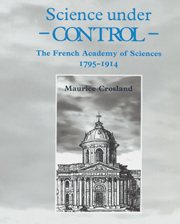Book contents
- Frontmatter
- Contents
- List of tables and figures
- Preface
- List of abbreviations
- INTRODUCTION
- 1 SCIENCE IN FRANCE
- 2 THE STRUCTURE OF THE ACADEMY
- 3 THE FUNCTIONING OF THE ACADEMY: SOME POSSIBLE ROLES
- 4 SCIENCE DIVIDED: THE SECTIONS
- 5 THE ACADEMICIANS
- 6 ELECTIONS: ‘GREEN FEVER’
- 7 REGISTRATION, JUDGEMENT AND REWARD
- 8 THE PRINTED WORD
- 9 AN ACADEMY UNDER GOVERNMENT CONTROL
- 10 ‘OUTSIDERS’: THE SCIENTIFIC FRINGE AND THE PUBLIC
- 11 THE INTERNATIONAL DIMENSION
- 12 THE CONTROL OF THE ACADEMY AND OF SCIENCE
- Name index
- Subject index
12 - THE CONTROL OF THE ACADEMY AND OF SCIENCE
Published online by Cambridge University Press: 09 October 2009
- Frontmatter
- Contents
- List of tables and figures
- Preface
- List of abbreviations
- INTRODUCTION
- 1 SCIENCE IN FRANCE
- 2 THE STRUCTURE OF THE ACADEMY
- 3 THE FUNCTIONING OF THE ACADEMY: SOME POSSIBLE ROLES
- 4 SCIENCE DIVIDED: THE SECTIONS
- 5 THE ACADEMICIANS
- 6 ELECTIONS: ‘GREEN FEVER’
- 7 REGISTRATION, JUDGEMENT AND REWARD
- 8 THE PRINTED WORD
- 9 AN ACADEMY UNDER GOVERNMENT CONTROL
- 10 ‘OUTSIDERS’: THE SCIENTIFIC FRINGE AND THE PUBLIC
- 11 THE INTERNATIONAL DIMENSION
- 12 THE CONTROL OF THE ACADEMY AND OF SCIENCE
- Name index
- Subject index
Summary
The man of science and the man of letters, who wishes to enjoy perfect and unlimited freedom, should renounce academies and [paid] positions.
(P. J. Pelletan, surgeon and members of the First Class in open letter to members of the Institute, n.d. but c. 1804.)The regulations of the French Institute would appear … revolting and injurious to the feelings of an Englishman.
(G. Moll, On the alleged decline of science in England, 1831, p. 24.)The Academy has decided, after a vote on the subject, that from now on it will only accept measurements according to the metric system in its publications.
(C.R., 102 (1886), 187.)The power of modern science
By the nineteenth century science had reached a period of adolescence. Following this metaphor, the sixteenth and seventeenth centuries would correspond to a period of childhood when, after a long infancy, the universe began to be thought of in non-geocentric terms and investigations began with new scientific instruments like the telescope and the microscope. The seventeenth century also witnessed the beginnings of serious scientific organisation. Enough natural wonders had been revealed for some governments to begin to think that this new activity should come under state control, or at least state supervision. There is no better example of this than the Royal Academy of Sciences, founded in Paris in 1666 under the patronage of Louis XIV.
Whatever one's view of the control of science, one may feel that the French were far-sighted to see in immature science an activity capable of enormous growth.
Information
- Type
- Chapter
- Information
- Science under ControlThe French Academy of Sciences 1795–1914, pp. 396 - 441Publisher: Cambridge University PressPrint publication year: 1992
